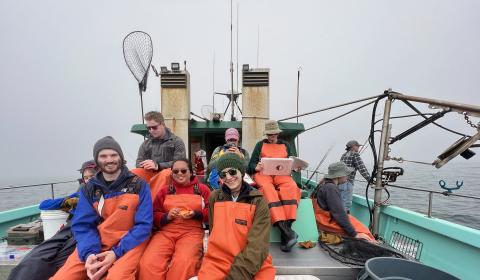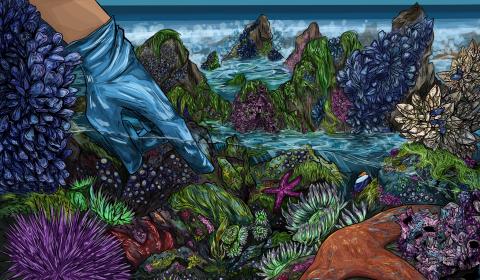Meet Our Researchers Blog Posts
How Can Seagrasses Help Mitigate Climate Change?
On a triple-digit summer day in Davis, community members found shade and science within the walls of G Street WunderBar at the latest Davis Science Café. Standing at the front of the pub, marine geochemist and oceanographer Tessa Hill showed the audience a picture of a fog-shrouded Tomales Bay and asked them to reflect on their connections to the ocean.
“Maybe it’s a recent visit or maybe it’s a family memory,” she said. “Maybe it’s a food that you love to eat that comes from the ocean.”
As the audience considered their connections, Hill discussed the rapid changes occurring in the oceans due to human-induced climate change: swings in ocean temperatures, unprecedented sea level rise and tectonic shifts in ocean chemistry.
What Rockfish Can Tell Us About Pollution
The California Collaborative Fisheries Research Program (CCFRP) is a partnership that brings together marine researchers, management agencies, and local fishers.
8,000 Fish in 12 Days
“Are we gonna catch some fish today?”
“We’re gonna catch some goood fish!”
Jordan Colby and Francine De Castro are Master’s Students in the Toxicology, Physiology, Ecology and Conservation (ToPEC) Lab run by Assistant Professor Christina Pasparakis. They refer to the strong winds and rough weather of Bodega Bay as “Blow-dega Bay.” Leaving at six o’clock in the morning for a two-and-a-half hour mission, Colby and De Castro embark on a trip not only for research with other scientists, but for companionship with local anglers.
With funding from California Sea Grant, the California Collaborative Fisheries Research Program (CCFRP) provides an insightful volunteering experience with rockfish. The program operates along the California Coast with six institutions ranging from UC San Diego up to the UC Davis Bodega Marine Laboratory (BML).
The Pathways Program
“Everyone is inherently valuable,” states Dr. Claire McKinley, Assistant Professor of Environmental Science at Bellevue College, “there has to be room for students coming from different places with different perspectives.” Paired with Dr. Alyssa Griffin, Assistant Professor of Biogeochemistry at UC Davis, the two foster a welcoming environment at the Bodega Marine Laboratory.




